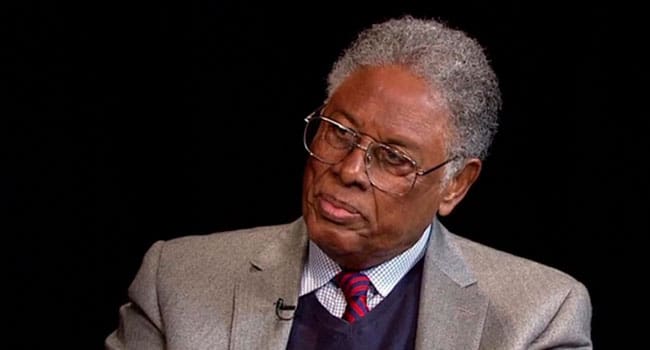Economist Thomas Sowell offers Canada a roadmap to overcome its current economic and political crises

For interview requests, click here
In 2024, the economic and political deterioration of our beleaguered country accelerated. There’s no better reference in searching for solutions than the great American economist Thomas Sowell.
Sowell was born into a family of North Carolina sharecroppers in 1930. He began his career as an ardent socialist, writing his college thesis praising Marx’s Das Kapital. But while an intern with the federal Department of Commerce, his views changed completely: he became a fervent advocate of free-market economics and an articulate critic of the damage caused by the sustained growth of government. Sowell taught economics at leading American universities, including Cornell, where he was mentored by the great Milton Friedman.
Sowell’s career coincided with the emergence of affirmative action – which led many people to assume that, despite his distinguished qualifications, he had been hired because he was black. Seeing how other highly capable people faced the same demeaning assumption only reinforced his opposition to affirmative action. At age 94, Sowell recently published a widely acclaimed book on the subject: Social Justice Fallacies.
 Thomas Sowell warns that moral decay and growing bureaucracy threaten freedom. |
| Recommended |
| Economist Thomas Sowell tackles ‘Social Justice’ head-on in new book
|
| Thomas Sowell remains one of a kind
|
| Why almost everyone is wrong about racism
|
Thomas Sowell’s writings cover a wide range of subjects highly relevant to Canadians. His insights into moral values, freedom, socialism, and bureaucracy provide timeless lessons on the challenges societies face.
On moral values and freedom:
- Without a moral framework, there is nothing left but immediate self-indulgence by some and the path of least resistance by others. Neither can sustain a free society.
- If you have always believed that everyone should play by the same rules and be judged by the same standards, that would have gotten you labelled as radical 60 years ago, a liberal 30 years ago and a racist today.
- Freedom has cost too much blood and agony to be relinquished at the cheap price of rhetoric.
- What is ominous is the ease with which some people go from saying they don’t like something to saying government should forbid it. When you go down that road, don’t expect freedom to survive very long.
- It is usually futile to try to talk facts and analysis to people who are enjoying a sense of moral superiority in their ignorance.
The importance of moral values and individual responsibility forms the backbone of a free society. Sowell’s commentary on socialism and the welfare state expands on this idea, exposing the risks of dependency and the pitfalls of expanding government control.
On socialism and the welfare state:
- The more people who are dependent on government handouts, the more votes the left can depend on for an ever-expanding welfare state.
- Socialism has a record of failure so blatant that only an “intellectual” could ignore or evade it.
- The most fundamental fact about the ideas of the political left is that they do not work. Therefore, we should not be surprised to find the left concentrated in institutions where ideas don’t have to work to survive.
- Although the big word on the left is “compassion,” their big agenda is dependency.
- The welfare state is not really about the welfare of the masses. It is about the egos of the elites.
- I have never understood why it is “greed” to want to keep the money you have earned but not greed to want to take somebody else’s money.
- The real goal should be to reduce government spending rather than increasing tax rates to cover ever-rising spending.
Sowell’s critique of socialism is matched by his sharp observations on bureaucracy, where inefficiency and misplaced priorities often dominate.
On bureaucracy:
- You’ll never understand bureaucracies until you understand that for bureaucrats procedure is everything and outcomes are nothing.
- It’s hard to imagine a more stupid or dangerous way of making decisions than by putting those decisions in the hands of people who pay no price for being wrong.
- Open-ended demands are a mandate for ever-expanding bureaucracies with ever-expanding budgets and powers.
- People with time on their hands will invariably waste the time of people who have work to do.
Bureaucratic inefficiency, coupled with historical grievances, creates an environment where societal progress is hindered by misplaced priorities.
On placing blame for the actions of ancestors:
- It is self-destructive for any society to create a situation where a baby who is born today automatically has pre-existing grievances against another baby born at the same time, because of what their ancestors did centuries ago. It’s hard enough to solve our own problems without having to solve our ancestors’ problems.
- It’s a little much when people come to this country preaching hatred against others and demanding tolerance for themselves.
These observations extend to the education system, where Sowell identifies a shift from learning to indoctrination.
On education:
- Education is not merely neglected in schools today but is replaced by ideological indoctrination.
- Much of what is promoted as “critical thinking” in our schools is, in fact, uncritical negativism toward America’s history and institutions and uncritical praise of the cultures of foreign countries and domestic minorities. (This certainly applies to Canadian schools as well.)
- The problem isn’t that Johnny can’t read. The problem isn’t even that Johnny can’t think. The problem is that Johnny doesn’t know what thinking is; he confuses it with feeling.
- It doesn’t matter how smart you are unless you stop and think.
Sowell’s insights are as relevant today as ever, providing a roadmap for societies in search of renewal. My hope for our country in 2025 is a renaissance of political and administrative leadership that better reflects the timeless principles espoused by this truly great man.
Gwyn Morgan is a retired business leader who has been a director of five global corporations.
Explore more on Socialism, Leadership, Canadian economy, Civil rights, Rights and Responsibilities
Troy Media is committed to empowering Canadian community news outlets by providing independent, insightful analysis and commentary. Our mission is to support local media in building an informed and engaged public by delivering reliable content that strengthens community connections, enriches national conversations, and helps Canadians learn from and understand each other better.

